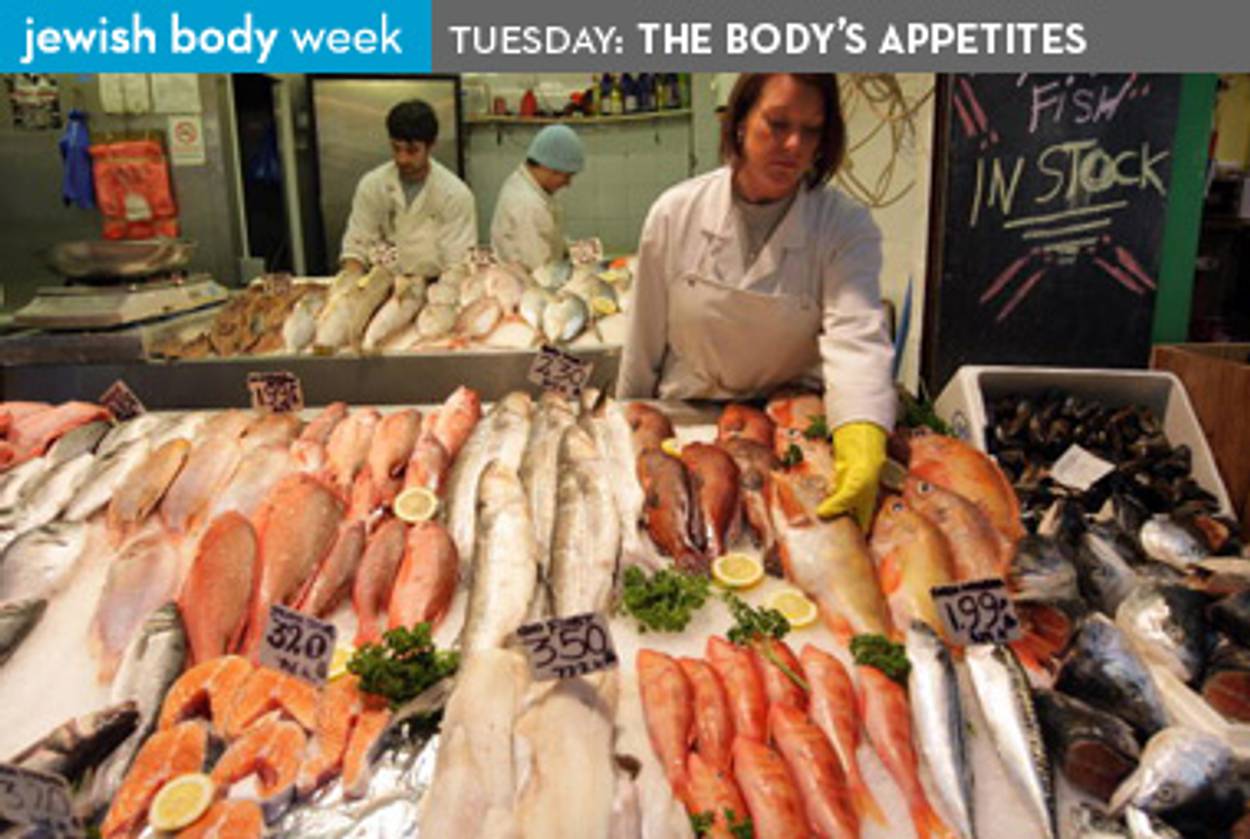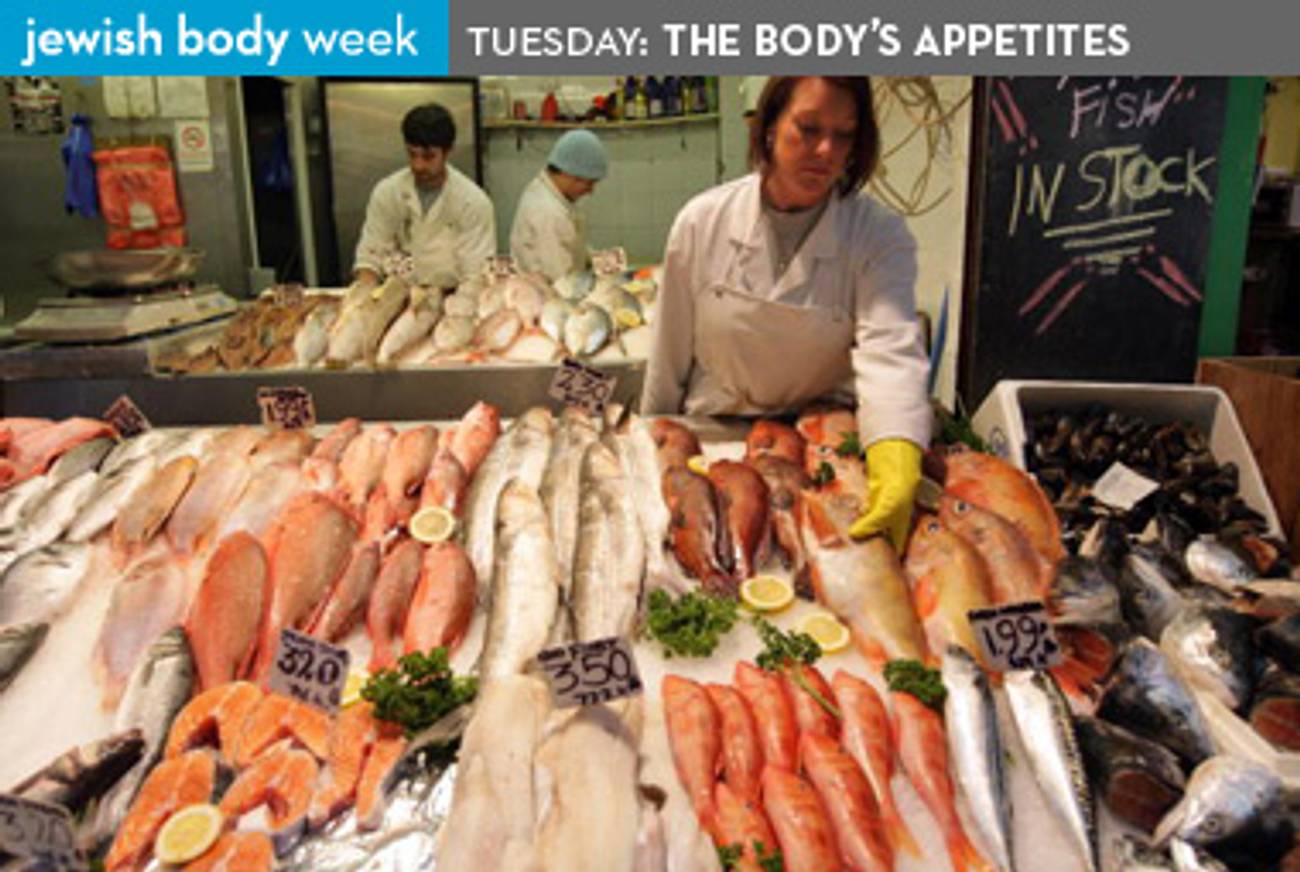Hunger Pangs
Vegetarianism grew too limiting for one writer, but kashrut, at least as she interprets it, never did




When I ordered the blackened redfish at a North Carolina restaurant in August, I hadn’t eaten any meat or fish in more than 13 years. Being a vegetarian had been easy, and I’d rarely been tempted to stray. Sure, certain cooking aromas—a roasting turkey, chicken soup simmering on the stove top—could still make me close my eyes and draw a deep, controlled breath, but those whiffs were largely abstract, disembodied. So when I eased my fork into the redfish—locally sourced, its thin, spicy crust offsetting the mild, white flesh—it was delicious in ways that were familiar, if tricky to pinpoint.
Growing up in a kosher home, I always took for granted that I’d be confronting a limited menu, though the way my family practiced kashrut was a lot less restrictive than the way some other families did. We had two sets of dishes, of course, and never mixed milk and meat. We never ate a huge amount of meat anyway, but what we did consume was kosher. Anything on the list of forbidden animals (from the obvious—pig, shellfish—to the less intuitive, like catfish) was verboten. We ate in restaurants pretty often, which wouldn’t have been possible if we were limiting ourselves to kosher ones; in public, we were vegetarians by default. Perhaps owing something to the fact that my father is a Reform rabbi, we were practically the only family I knew who kept kosher, but our version of things made sense to me and was what I’d always known.
It was so ingrained in me that that’s what kashrut was—basic vigilance, and some manageable rules that were foreign to most people—that I was shocked to discover that more observant Jews made kashrut look like obsessive-compulsiveness. For them, kashrut meant they couldn’t eat in non-kosher restaurants or in the homes of friends who didn’t keep kosher. Everything they bought—from chicken to cereal to chocolate—needed to be certified by a solemn rabbinic authority. Conscious consumption was one thing, but it seemed strange to me to take such fanatical caution with absolutely everything you ate. The fundamental rules of kashrut, as I understood them, were about there being things you could eat and things you couldn’t. Cheese pizza, Goldfish crackers, and unfrosted Poptarts might not have a hecksher, but what could possibly be un-kosher about them?
I might have gone on to decide that an illicit cheeseburger was the perfect act of teenage heresy. Instead, I became a vegetarian. It just made sense: I was hanging around with a bunch of vigilant animal-rights types, and at 14, in a small town north of New York City, taking that kind of stand was invigorating. Although I flirted with militancy, the decision was more instinctive than ideological. I didn’t even really like burgers. And though I had come to believe that all meat consumption was wrong, it was some comfort to know (as I digested some very convincing propaganda: horrifying undercover footage of blood-clogged slaughterhouses, and pamphlets that graphically detailed the injustices of jam-packed feed lots), that I’d never really been implicated in any of it. Those particular slaughterhouses weren’t where kosher meat came from; surely those would look different. For all of kashrut’s strange rules, the ethics had always been what really spoke to my family. My dad liked to say that keeping kosher was the next best thing to being a vegetarian; since keeping kosher meant animals suffered less, your meat supposedly arrived on your plate with less baggage. By choosing to keep kosher, I reasoned, Jews could opt out of the particularly appalling practices of the mainstream meat industry. I could rag on my parents for their occasional steaks and barbecued chicken, but compared to the rest of the world, they were less culpable.
By becoming a vegetarian, I was conveniently exempting myself from the specifics of kosher laws, But I was also building on those principles as my family practiced them, taking certain ethics to their logical conclusion. Being a vegetarian just meant I didn’t have to understand any of it in Jewish terms. Not surprisingly, I wasn’t thinking about that at the time.
Over the years, people would ask me why I shunned meat and fish: was it because of health issues? Moral ones? Did I think I’d eat this way forever? I’d shrug and say I didn’t know, and explain that it was hard to picture myself doing otherwise. Every once in awhile I’d find veganism seductive, and would tell myself that if I really cared about animal welfare, I wouldn’t eat eggs and milk products, either. Somewhere along the way, though, any dogma that once motivated my diet fell away. I started to remember that I’d made a choice. “We do what we can,” I began rationalizing, the handy slogan equal parts truth, consolation, and evasion.
I won’t try to explain my shift, because I can’t necessarily defend it. Let’s just say that my Food Network infatuation and habit of binging on food criticism took their toll: for the first time, I’m finding I want to taste prosciutto-wrapped figs, crab cakes, and southern fried chicken from the place down the street. I want to explore mysterious, possibly gross, yet fascinating foods like raw oysters. There’s a delicious novelty to eating certain things for the very first time in my late twenties, like I’m starting from scratch.
At least in theory—I haven’t quite gotten there yet. Some subconscious limits are hard to overcome. That redfish was one thing, but when I see shrimp or crab on a menu, my eye instinctively glosses over them. I’m daunted: it’s not my food. We don’t eat that, says a voice in my head. Theoretically, I may be eager to eat adventurously, but my childhood eating habits are having an unexpected influence on what I can stomach. Though I’ve never felt strongly about keeping kosher, I can’t deny the hold its basic rules have on me, more than a dozen years after I last ate anything they specifically sanctioned. It’s a reflex, really—a blocked nerve.
When I was growing up, my family’s diet reinforced the fact that we were different, at a time when that was the last thing I needed to be reminded of. When my mom was a kid, her family didn’t keep kosher outside their house in any way. And my dad’s family didn’t keep kosher at all. “I certainly don’t feel commanded to do it,” my mom told me recently. Jewishness is ingrained in me in ways I can’t always explain, and one of the places it’s hunkered down seems to be my palate. But I don’t want to relate to it by way of restrictions on things I’ve never experienced. Left up to me, Judaism isn’t about what I can’t have, or won’t try. For that, there’s always vegetarianism.
Eryn Loeb, a contributing editor for Tablet Magazine, is a freelance writer and editor in New York.
Eryn Loeb, a contributing editor for Tablet Magazine, is a freelance writer and editor in New York.